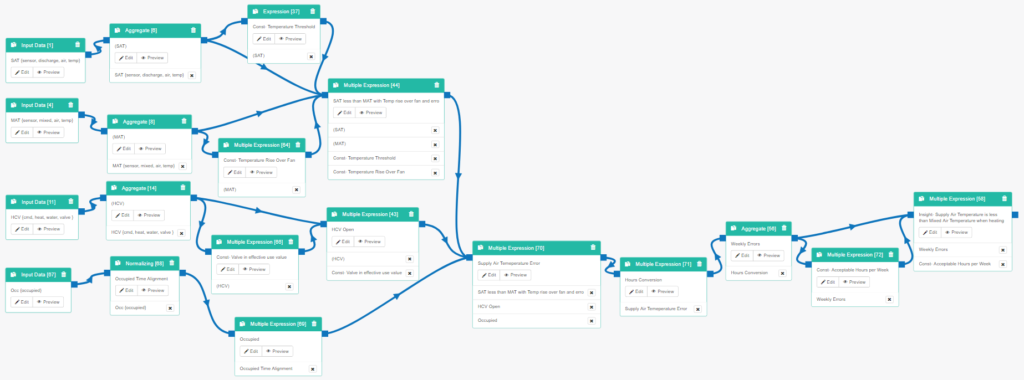Applicable Systems
- NIST: APAR1
- Primary: AHU, RTU
Objective/Method/Outcome
- Objective: Determine if the heating system is having issues due to possible improper sequencing or equipment failure. Based on NIST APAR 1.
- Method: Check if the SAT is less than the MAT when the HCV is open during occupied hours.
- Outcome: An insight is generated if the SAT is less than the MAT while the HCV has been open for more than 8 hours.
Logic
If(MAT + Temperature Rise Over Fan - Temperature Threshold > SAT && HCV > 20% Open) {return true;}

Notes
This rule compensates for the temperature rise across a supply fan between the MAT and SAT sensors. This value varies per system, and the parameter should be changed within the logic flow accordingly. The temperature rise over a fan is currently to 1.1 degrees in accordance with NIST recommendations. The HCV must be over 20% in order for this rule to take effect, as its cooling effects will be insignificant otherwise.
Inputs
- SAT {sensor, discharge, air, temp} (Real Trend Log)
- MAT {sensor, mixed, air, temp} (Real Trend Log)
- HCV {cmd, heat, water, valve } (Real Trend Log)
- Occ {occupied} (Binary Trend Log)
Parameters
| Parameter | Expression Block Series Number | Description | Default Value (Units) |
|---|---|---|---|
| Temperature Threshold | 37 | The acceptable temperature deviation from set point that is considered normal | 2 (C) |
| Temperature Rise Over Fan | 64 | The temperature increase caused by air passing over a fan. This should be changed based on the site and system. | 1.1 (C) |
| Valve Open | 66 | The valve position for which the cooling provided by the CC is considered significant. | 20 (%) |
| Acceptable Hours per Week | 72 | The amount of time that this error is allowable for the unit per week. Anything more than that time is considered a fault. | 8 (h) |
